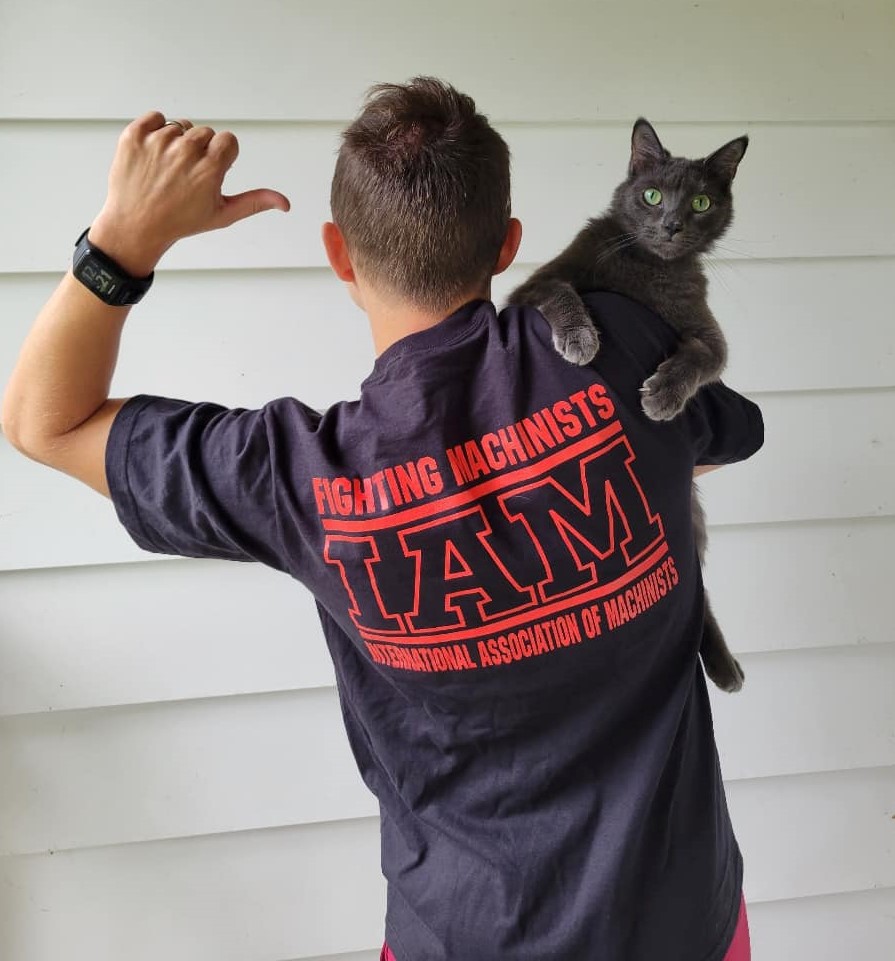Thrive to close veterinary ER hospital amid union talks – News

Sam Estes
Photo courtesy of Sam Estes
Sam Estes, a licensed veterinary technician at Veterinary Specialists Emergency Services in Rochester, New York, worked on the successful union drive there. But last week, Thrive Pet Healthcare announced it will close the hospital, meaning Estes and 131 co-workers will be laid off by November at the latest.

“We are stunned,” begins a message posted to the Facebook page of the labor union at a hospital in Rochester, New York. The post refers to the discovery of an email from the owner, Thrive Pet Healthcare, to referral practices announcing a plan to close the hospital later this year.
“Thrive didn’t even have the decency to notify the hospital staff,” the post continues. “We found this by chance. They didn’t even intend for us to see it.”
Thrive, previously known as Pathway and the owner of more than 400 practices in 37 states, confirmed that it intends to close the hospital, Veterinary Specialists Emergency Services, no later than Nov. 27. The fact that the hospital’s more than 100 staff learned the news through an email was an accident, according to a company statement provided to the VIN News Service on Aug. 25.
“Yesterday, an email draft meant for referral practices was mistakenly circulated internally, announcing the upcoming closure of VSES,” the statement said. “We deeply regret that this is how the VSES team was informed about this tough decision. As soon as we realized the error, we promptly issued an official communication to our team members. Additionally, we held on-site meetings today to provide more details and address any questions from the team.”
The closure will result in 132 staff layoffs, according to a notice filed by Thrive to the New York Department of Labor.
News of the closure comes as VSES support staff, who voted to form a union in January 2022, were in contract talks with management. If the closure goes ahead, it will be the third hospital since 2020 to close in the middle of labor negotiations. The other two were under the Mars, Inc., umbrella — VCA San Francisco Veterinary Specialists and BluePearl Pet Hospital in North Seattle.
Compounding woes for labor advocates in upstate New York, the union representing workers at a Buffalo, New York-area hospital withdrew its representation in mid-July, citing a lack of support among workers only one year after they voted to join.
Since 2018, support staff at eight hospitals have voted for collective bargaining for veterinary support staff. They say they want improved workplace safety, training, staffing, professional development, and better compensation and benefits. Only one of the unions has managed to make it all the way to a signed contract. (See sidebar for complete list.)
Thrive blames doctor shortage
The workers at the hospital slated to close in Rochester voted to join the International Association of Machinists and Aerospace Workers (IAMAW) in January 2022. Employees who decide they want union representation may form their own union and negotiate for themselves; form their own union and affiliate with an existing union; or join an existing union. Because the process is complicated, most fledgling groups join or partner with an existing union.
Negotiations between the union and management began in December and continued until as recently as July.
In its statement, Thrive, which is majority owned by the private equity firm TSG Consumer Partners, described the decision to close the hospital as “one of the most difficult ones we’ve made as a company.” It also pointed to a lack of emergency doctors in the area as the cause.
“We explored multiple options to remain in service, including recruitment and staffing with a rotation of doctors from other clinics in the area. The pool of full-time or relief candidates with emergency and surgical care experience is very limited. This is a nationwide challenge that our team is experiencing acutely in the Rochester region.”
The statement also addressed the impact on employees.
“We recognize the impact of this challenging situation on our team members and their families and are wholeheartedly dedicated to supporting their well-being. Thrive anticipates working with team members affected by the closing of VSES to provide financial support through severance packages, paid time off to help them explore alternative employment, and transfer opportunities consistent with Thrive’s policies.
“For union members at the site, we anticipate negotiating similar benefits to assist them through this difficult transition. We care deeply about our team members and are committed to treating everyone with care and respect through this process.”
VSES is not the only Thrive-owned clinic with a support staff union. In January, Eye Care for Animals, an ophthalmology clinic in Chicago, voted to join IAMAW.
Other perspectives on closure
Labor unions at U.S. veterinary practices since 2018
April 2018
- VCA San Francisco Veterinary Specialists
- International Longshore and Warehouse Union (ILWU)
- No contract adopted. Hospital closed in 2020.
Sam Estes, a licensed veterinary technician who has worked at VSES for his entire 15-year career, takes issue with the idea that a shortage of veterinarians in the region precipitated the closure. He blames Thrive for failing to keep the veterinarians it had.
“We’ve been losing doctors since Thrive bought us in 2021,” he said. That trend accelerated this summer when, according to Estes, a group of ER doctors asked the company to negotiate new contracts.
“They were like, ‘OK, we need to talk about our contracts and what our schedule looks like because we’re nervous that we’re just going to get stuck with working all the time and not get any benefit and relief,’ ” Estes said. “But Thrive chose not to negotiate with them, and that triggered five doctors to put in their notice.”
Estes also said it seems pretty clear there is nothing the union can do about Thrive’s decision. Under the labor laws, “[owners] can pretty much do anything to run their business,” he said, including closing.
Rachel Barnhart, a state legislator from the Rochester area, sent a letter to the Federal Trade Commission on Friday, asking it to scrutinize Thrive’s decision.
In the letter, Barnhart expresses doubt about VSES’s stated reason for closing.
“While the shortage of veterinarians nationwide is well-documented, so is the impact of private equity firms buying up practices,” she wrote. “Private equity is notorious for squeezing every dime from companies over the short term, driving up consumer costs while limiting investment in staff and services. This crisis requires innovative solutions, and the kinds of investments private equity firms are unwilling to make.”
Barnhart also called the announcement “disturbing and suspicious” considering the staff union drive. “One way to bust a union is to conveniently close shop,” she wrote.
Perils of protracted bargaining
While ratifying a first contract — establishing pay, benefits, job security, scheduling, safety, working conditions, etc. — may sound like the natural outcome of joining a union, it is anything but, according to analysts at the Economic Policy Institute, a nonprofit think tank.
A May fact sheet cites four studies that show a consistent pattern of long delays in bargaining driven by management “resulting in the increased likelihood that unions will not reach a contract,” according to the authors. They add that delays undermine morale and cohesion in the bargaining unit. This is especially true for workers in professions with high turnover, which is a factor among veterinary technicians, according to a 2022 demographic study by the National Association of Veterinary Technicians of America.
Those drawbacks emerged at VCA Northwest Veterinary Services (NWVS) in Clackamas, Oregon. The union representative told VIN News in 2020 that management at the clinic took every opportunity to delay negotiations and, when the Covid-19 pandemic hit, rejected requests for hazard pay or other compensation for working in the face of increased risk.
The nearly three-year-long process proved too much for the employees, who decided they no longer wanted to be represented by the union.
Over in the Buffalo area, meanwhile, the bargaining phase also proved too much for the union at Orchard Park Veterinary Medical Center, a 24-hour emergency and specialty hospital owned exclusively by veterinarians.
Almost a year to the day after Orchard Park voted to join the Communications Workers of America Local 1168, its president, Cori Gambini, emailed a letter to support staff, saying: “At this juncture we understand that the Orchard Park employees are not ready for unionization. For that reason, we are stepping back.”
This means if workers there want a union, they’ll have to start again from scratch, according to Mary Nowocien, director of mobilizing and organizing for CWA Local 1168.
“When we originally organized, we had great support,” Nowocien said. But over the course of the year, the situation changed. Around 50 staffers left, about one-third of the unionized workforce. “The turnover was insurmountable,” she said.
She also described management as aggressive in fighting the labor effort. “Orchard Park did everything possible to keep us out,” she said. “They had a union-buster at the bargaining table; managers and supervisors were intimidating folks.”
She called the outcome of the effort “heartbreaking.”
Through spokesperson Earl Wells III, Orchard Park provided a statement to the VIN News Service from the management team, which read, in part:
“Orchard Park Veterinary Medical Center is pleased that this matter is behind us, and we are not going to respond to claims made by the union as to why their effort was not successful.
“Ultimately, it was the staff who made the decision that a union was not in their best interests.”
The statement also said: “Management has always had an open door policy with our staff to discuss their issues and concerns. This policy allows us to focus on our mission and vision of always providing services based on our patient’s needs and always being our patient’s advocate. We appreciate the hard work of our staff in fulfilling our mission and vision.”
One view from inside
Kat Bennett is among a small group of employees to have been represented by a union at a private veterinary clinic. A veterinary technician, she helped with the union drive and served as a union steward at Columbia River Veterinary Specialists in southwest Washington. She left for personal reasons in August 2021, about a year after the first contract was ratified.
She said that while being in a union didn’t make a big difference in her day-to-day duties, it improved how she felt about her working conditions and her colleagues.
“I had protection from unfair accusations from management, which was a good feeling,” she said. “I feel there was more camaraderie — a union is just a bunch of workers organizing to make their work life better.”
She is now working on an at-will basis and has given up the guaranteed cost-of-living raise that was included in the union contract at her former workplace.
However, she said, she maintained some intangible benefits: The union experience helped her to focus on what she wanted in her new job.
“I definitely grilled my to-be employer about how they treat their employees,” she said, adding that she was open about her organizing work at Columbia River. “They hired me anyway.” She took that as a positive sign, saying, “If you treat your employees well, you don’t have to worry about a union.”
Union members at Columbia River approved their second contract in early August.
Sept. 1 update: The unions representing support staff at All Creatures Animal Hospital announced that a collective bargaining agreement has been reached. This is the first contract for a union co-represented by the National Veterinary Professionals Union, which launched in 2017, and the second veterinary support staff union to ratify a contract since the labor push began in 2018.
link







